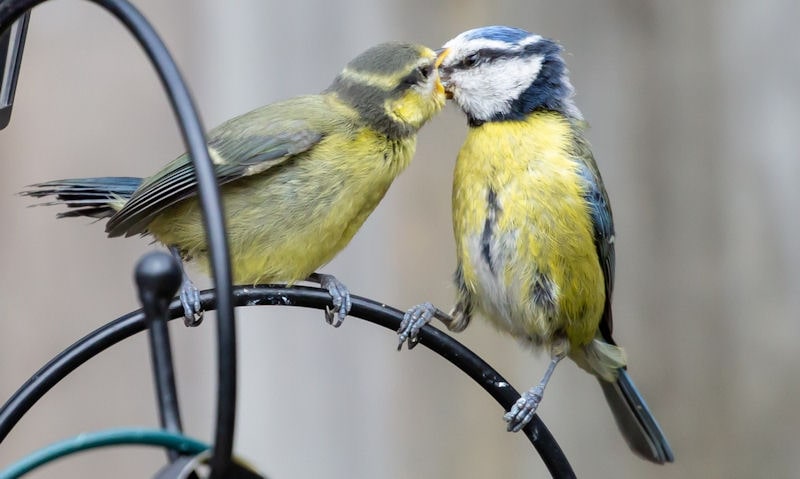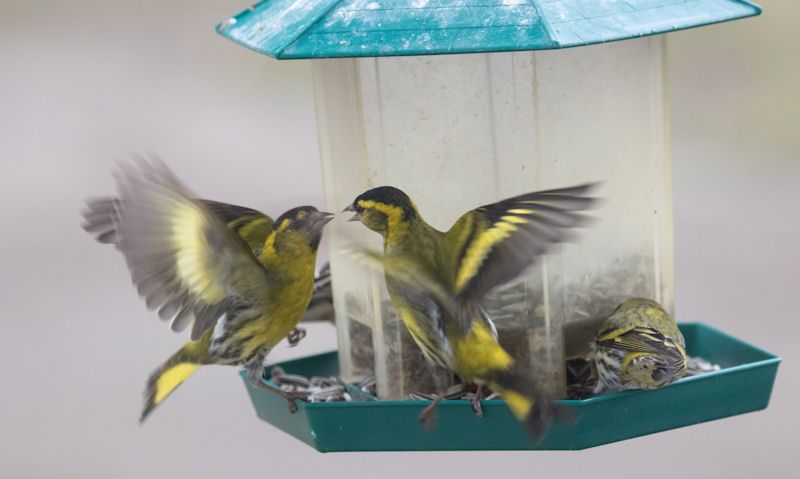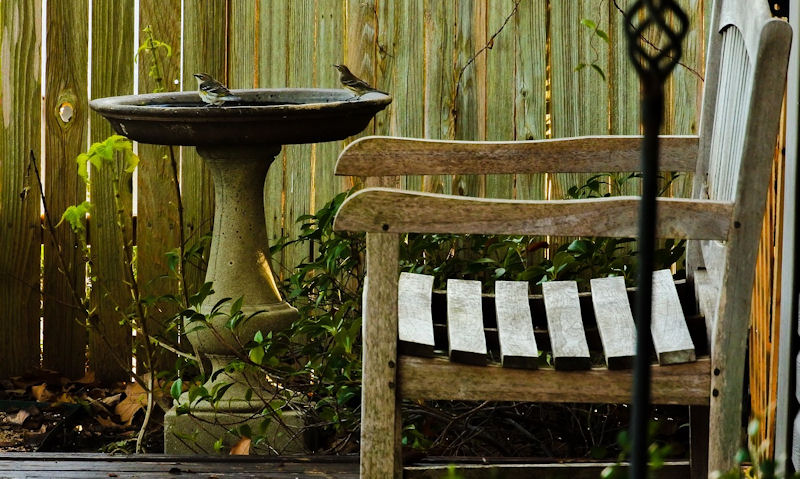Best time to feed birds
Beat the early morning feeding frenzy on the bird feeding station or bird table by simply replenishing feeders the evening before.
Never a better time to feed birds in your garden than before 7:00AM; in the UK this is the time birds begin to feed when dawn breaks come Spring through Summer. In Autumn through Winter you can wait until 8:00AM to 9:00AM, as earlier than this, wild birds tend to not show up in numbers as its till dark out.
Common mistake while setting up bird feeders in the morning is doing so when it correlates with wild birds feeding times.
Birds who visit your garden to use bird feeders do so almost on time, depending on the time of the year - but to be out in the garden when they're due can only make things difficult - often resulting in them going elsewhere.
Replenish wild bird feeders the evening before the morning after then, as you can be sure you have food out in time for their arrival, all while avoiding the need to disrupt their early morning breakfast.
So early in fact its about 7:00AM - give or take an hour - birds begin to feed, so if you can replenish feeders long before this, then go ahead.
Remember, to stop feeding birds on a regular basis would only see them go elsewhere, so stick to a strict routine as birds will soon forget about your feeders, while preferring to hop over to your neighbours instead.
While the best time to feed birds is before 7:00AM, that is not to say you can forget it for the rest of the day. Depending on the time of year, you may need to top up at NOON or later into the afternoon - as to avoid bird food running low or running out completely.
Late evening for morning rush
Common wild birds who visit our British gardens do so mostly early in the morning, all year round.
I therefore recommend setting up the wild bird food long before this time.
To feed wild birds in time then I would do so the day before, preferably late in the evening just as the light is fading.
That way I can avoid wild birds that feed late into the evening as to avoid them gobbling up new food, put out that's intended for the next day.
Setup the wild bird feed in the evening so you can be sure the birds have gone back to the nest for the night - in the nesting in roosting season.
What you should never do then is feed wild birds in your garden early in the morning, as its never going to be early enough.
No waiting until morning
Why wait until first thing in the morning when you can sort out wild bird feed the evening before - in time for the very, very early morning feeding frenzy.
To get the food up and hanging the night before it could indeed save yourself an extra hour in bed.
Birds begin to feed in the garden as early has 6:00AM, so you'd need to beat that which is far to early for most people. Even 7:00AM is a popular time for feeding birds so if you know you can replenish feeders earlier than this, then please do so.
However, to feed wild birds this early in the morning is going to put a dampener on their schedule, as the person laying out bird food is going to disrupt proceedings.
The idea is to get the feed up as early has you can - but hopefully the night before - as to avoid entering the garden just when wild birds come to visit.
Replenish later in day
Get the wild bird feed up the evening before then to avoid disrupting their natural feeding time, early in the morning.
If you know you can do so at 5:00AM or when its still dark in the morning, then this would be perfectly acceptable. You must not be there when wild birds naturally come to visit.
Having said that, a 6:00AM or 7:00AM feeding might not be the only time to lay out food.
In fact in times the wild birds require more food in harsh weather conditions, is the time they will come calling to your hanging bird feeding or the bird table more often.
Its then imperative you get a handle on how much wild bird feed is eaten in the morning, as to know when to replenish later in the day.
It may be safe to say all through the morning you probably won't need to fill up feeders again, but come NOON or earlier in the afternoon - topping of the feeders again may be vital then as natural food is in short supply in the wild for them.
No removing waste until late
Its an exciting time as you encourage wild birds to visit your garden to feed, but more so when its rare bird species who only show up once in a while.
Its easy then to continue to play around with your hanging bird feeders on the bird feeding station or bird table - but you must resist coming into the garden to regularly.
Your continuous presence is only going to deter wild birds rather then see them visit in fear of people, pets or moving objects near to the food source.
Feed the wild birds once in the morning while avoiding the garden for the rest of the day.
You'd need to see how much food is indeed left in the feeders or bird table as to get an idea when or if it needs replenishing. But the less time you spend walking about in the garden is surely going to benefit wild birds.
Really, you are not going to see much waste in the feeders as the food can be left out all day, so wait until the evening or when the birds stop feeding as the light fades later on.
Busiest time 7AM to 10AM
Busiest time then is 7:00AM through to 10:00AM in good weather only, but absolutely can wild birds come long before or after this busy time.
Its only when the sun comes up and there's plenty of lighting, would then birds come calling to bird feeders.
The 7:00AM is an approximate time only mind you, they could come far earlier in the height of summer time while in winter; it would still be dark so there's no visitation until it lights up in the morning.
Birds can and will feed in the rain but you may also see fewer birds feeding if these wet conditions corresponds with dark overcast or low lighting.
In this short, busy 3hr window when garden birds feed in their numbers - in this time they must be left alone as to not disrupt what would be a fascinating insight to feeding birds.
Feed twice a day in bad weather
To get your bird feed setup in the garden in Spring through Summer - with a priority in vitamin rich food I might add - you may only need to feed them once.
However, that can soon change in Autumn but especially in winter months when the weather becomes really hard to handle for the delicate wild birds.
Example of that is food found in nature can be covered for long spells under hard frost, or worse still - covered in a thick blanket of snow. Likewise, a drought in a dry, hot summer can see food in nature disappear.
Its safe to say wild birds can depend on our bird feeders so they should come calling still, but in this time its important to shake or remove snow coverage if or when it occurs.
And while its imperative to continue to replenish food that runs down throughout the year, you'd soon notice how quickly it gets gobbled up in the cold weather as birds feed more to maintain their body fat.
In this time then its vital to continue to replenish bird feeders two to three times a day, while leaving out more protein rich food is certainly going to help them survive the winter.
Best time summary
Best time to feed wild birds in your garden then would actually be the night before, this way you can catch the early risers.
Let's be honest, you are not going to want to get up an hour early just to be on time to feed wild birds... so let's get the food out the night before.
As wild birds begin to return to their nest as the evening draws in and the light fades, you can then use the remaining natural outdoor light to replenish the feeders.
One or two birds may show up for the last time thereafter, but this food is going to be ready for the early morning rush the following morning.
To wait until the morning to fill up bird feeders may be too late, or correspond with the time wild birds are ready to come calling. Its best then to do it the night before as to avoid disrupting their early morning routine.
As a rule of thumb, and depending on the time of year, you'd want the bird feed out in the garden before 7:00AM - while birds then continue to come back and forth throughout the morning, often late into the afternoon.


